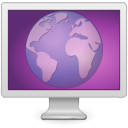Homepage › Forums › Articles › Operating Systems › OS X and Ancestors › OSX File Hierarchy
This topic was published by DevynCJohnson and viewed 3105 times since "". The last page revision was "".
- AuthorPosts
OS X, like other operating systems, have a specified file hierarchy. This is a set standard for the location of important directories and files. It may be beneficial to OS X users to have a deep understanding of the operating system's file hierarchy.
OS X has two kinds of directories in the root - user-friendly directories and standard Unix directories. The standard Unix directories are the folders that all Unix systems use as specified by the Filesystem Hierarchy Standard (FHS). Finder (OSX's file manager) typically hides the standard Unix directories. The user-friendly directories are specific to OS X and their names begin with a capital letter.
NOTE: Not all OS X systems will have all of the below listed directories.
- / - this is the root of the filesystem (the top)
- /Applications/ - contains apps that are installed from the App Store
- /Developer/ - Apple developer tools
- /bin/ - utilities for single and multi-user environments
- /dev/ - device files; this is a mount-point for a virtual filesystem called devfs
- /dev/fd/ - file-descriptor files
- /etc/ - global and system configuration files
- /Library/ - applications store app-specific resources in here
- /mach_kernel - the executable kernel file
- /Network/ - lists computers on the network
- /sbin/ - super-user binaries and essential system binaries for single and multi-user environments
- /System/ - contains files needed by OS X to run such as the I/O Kit drivers
- /tmp/ - this is a mountpoint for the tmpfs pseudo filesystem.
NOTE: A pseudo filesystem and a virtual filesystem are the same thing.
- /Users/ - the home directory for each user is found here
- /usr/ - user applications
- /usr/bin/ - applications
- /usr/include/ - standard C include files
- /usr/lib/ - libraries
- /usr/libexec/ - system daemons
- /usr/local/ - locally installed applications and libraries
- /usr/sbin/ - super-user programs
- /usr/share/ - platform-independent data files
- /usr/share/man/ - man pages
- /var/ - logs, spools, and other temporary files that are kept across reboots
- /var/backup/ - backups
- /var/log/ - system logs
- /var/mail/ - user mailboxes
- /var/spool/ - printer and mail spools
- /var/tmp/ - temporary files that are kept across reboots
- /Volumes/ - mounted storage
More filesystem topics - https://dcjtech.info/topic/filesystems/
- AuthorPosts
